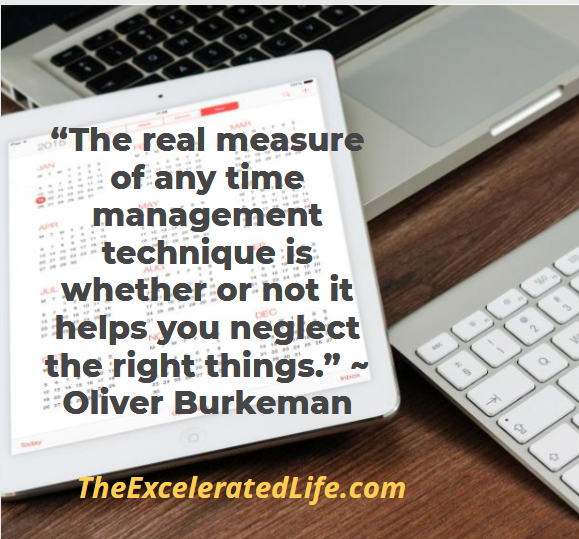We don’t have enough time to fit everything we want to do into our finite lives, and the more we try to, the more stressed and frustrated we feel. We must decide what truly matters in order to separate the really important from the merely important things we want to accomplish.
TheExceleratedLife.com

We have a limited amount of time (~4000 weeks).
I know you’ve heard this story before, but here it is again. Bear with me – there really is a point to this repetition.
A professor brought a wide-mouthed glass jar to class and set it on a table. From under the table, he brought out a bucket of large rocks. He began placing rocks into the glass jar until no more would fit.
He asked the class, “Is the jar full?”
“Yes!” they replied.
The professor reached under the table and brought out a bucket of gravel. He poured gravel into the jar and filled in the spaces between the rocks. Again he asked the class, “Is the jar full?”
“Probably not,” they responded, not wanting to be fooled again.
The professor reached under the table and retrieved a bucket of sand. He poured the sand, filling in the small spaces between the gravel and the big rocks. “Now is the jar full?”
“NO!” answered the class.
He lifted out a bucket of water and filled the jar to the brim.
“What have we learned?” the professor asked.
Someone answered, “If you try hard enough, you can always fit one more thing in.”
“No,” said the professor, “the lesson is this: If we didn’t put the big rocks in first, we could never have fit them in.” [Covey]
All the big rocks won’t fit.
I’ve always enjoyed this illustration as an example of the need to get the important things done. But recently, I’ve been turned on to a different perspective on this story, thanks to Oliver Burkeman’s new book, Four Thousand Weeks: Time Management For Mortals.
We’re never told this, but I suspect that there were more big rocks left in the bucket. And for that matter, more gravel, sand, and water than would fit into the jar. In fact, the ending should be more like this:
“‘What have we learned?’ the professor asked.
“Someone answered, ‘If you try hard enough, you can always fit one more thing in.’
“‘No,’ said the professor, ‘the lesson is this: You’ll never get all the big rocks in – they won’t all fit. So it is necessary that you select the big rocks you want to add and the ones you’ll have to choose to leave out.'”
“In the long run, we’re all dead.”
“In the long run, we’re all dead,” writes Oliver Burkeman. “The average human lifespan is absurdly, terrifyingly, insultingly short.” In fact, if you live to be eighty years old, you’ll have just over 4000 weeks (thus the title for Burkeman’s book). [Burkeman] Live till ninety, and you’ll have 4680 weeks. But if you only make it till seventy, you’ll have had 3640 weeks. The point, though, is not the precise number of weeks, but the fact that we all have a limited number of them. We’re not going to be able to do everything, even the important stuff.
So, how do we begin to decide? In his book Wait, What?, James E.Ryan writes that asking “What truly matters?” helps get you to the heart of life. [Ryan] Asking yourself “What truly matters?” is a good way to take stock of your life, and to begin deciding what is really important and not merely important. [Ryan]
We must differentiate between the really important vs. the merely important.
We don’t have enough time to fit everything we want to do into our finite lives. Even the big rocks – the really important things. The more you try to fit everything in, trying to feel in control of your life and your time, the more stressed and frustrated you feel. But, Burkeman tells us, when you “confront the facts of finitude instead – and work with them, rather than against them – the more productive, meaningful, and joyful life becomes.” [Burkeman] Burkeman calls this the “paradox of limitation”.
This has been an eye-opening concept for me and, frankly, a little comforting. I can’t do everything I want to do and I can’t do everything others expect me to do. Even the things I love and for the people I love. I have to choose carefully what to do and what to leave undone because I just don’t have enough time.
And guess what? Neither do you. It’s tough to face, but we both have a limited amount of time in this life. Let’s decide today to pick what’s most important of all the important things we want to do. And then let’s focus our time and effort on doing those things first.
What may be important.
Even though we may get this intellectually, it seems that even then we don’t always get around to doing the things we deem important. “We sense that there are important and fulfilling ways we could be spending our time,” says Burkeman, “even if we can’t say exactly what they are — yet we systematically spend our days doing other things instead.” [Burkeman]
So, what is truly important? Well, that is a question each of us must ask and answer for ourselves. What’s really important to one person may be merely important to another. And not at all important to someone else. However, when I think about this, here are the things that come to my mind. These are the truly important for me.
- family
- health: selffulness, fundamentals
- relationships: love, family, friends
- purpose
- growth and learning
Of course, a deep, meaningful spiritual life is important to me, too, but I view that as contextual for all the others. It surrounds and permeates all the other important things. They all exist within the framework of living in Spirit.
If you’re struggling to separate the really important from the merely important, a good place to start is to look at your values. If your important tasks are in congruence with your values, then those are likely the really important things for you.
“Nobody on their deathbed ever wished they’d spent more time at the office.”
Of course, there are some tasks — the pebbles and sand — that must be done; you have to shop, cook, bathe, and do a myriad of other chores that are a part of daily life. But don’t let those things chew up all your time. And especially don’t allow all the unnecessary things that clamor for your attention to take up your precious time. Do the necessary but also save some time to do your most important things (your MITs).
You and I have limited time on this earth. If we are to give our best in Service to the world, we’ve got some important decisions to make. And that’s how you embrace your Excelerated Life™!
Excelerated Simplicity™ — freeing yourself from unnecessary complexity — is one step in creating your Excelerated Life™, a life of flourishing and well-being, and a life of meaning, purpose, and service.
Read more about the Excelerated Life™.
Resources:
Burkeman, Oliver. Four Thousand Weeks: Time Management For Mortals. New York: Farrar, Straus and Giroux, 2021.
Covey, Stephen R. The Seven Habits Of Highly Effective People. New York: Simon & Schuster, 1989.
Ryan, James E. Wait, What? And Life’s Other Essential Questions. New York: HarperCollins Publishers Inc., 2017.


